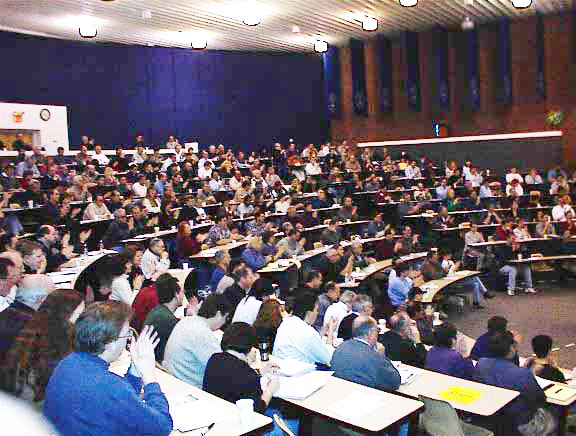 I sat for my CPA exam in the late 1970s. For those of you fortunate enough not to sit for the exam, it is a four part test given over 2 and a half days, if my memory serves. Tax, Law, Theory, Practice.
I sat for my CPA exam in the late 1970s. For those of you fortunate enough not to sit for the exam, it is a four part test given over 2 and a half days, if my memory serves. Tax, Law, Theory, Practice.
Many books and several courses were available to help prepare for the exam, with the nearest course to me being offered in Jacksonville, about an hour and half drive away. The courses ran every Saturday for 6 to 8 hours for several months prior to the exam. The cost was steep, close to a $1,000, if I recall, and that was thirty years ago. That is a lot of money now and it was even more back then, particularly since I was still in grad school. But the first Saturday was offered as a free trial so I headed on up in my VW bug to take a look.
There was a good turnout. I remember the auditorium being large and full. I even recognized some of my classmates. The lectures were fine, the materials were good. But my take on it was that they were basically reading the materials to us and I could read several times faster than they could talk. And I could to that at home, without driving 3 hours round-trip, much less paying $80 a pop times twelve.
I left at the lunch hour and headed home. I bought a set of self-study books published by a Dr. Gleim, a University of Florida professor. I decided that I would study 4 hours a day, 5 days a week, for the 6 weeks prior to the exam. I kept to that program religiously. I started at 8 a.m. every weekday and studied until noon. Didn’t answer the phone, didn’t daydream, didn’t think about studying, didn’t do anything but study. Okay, I took bathroom breaks and if I got really zonked I stepped over to a set of weights I had and did a rep or two to get my blood flowing. Then I went back to studying.
Where did I find the motivation? Why was I so disciplined? In part because I was a cheapskate. I wondered why all those people were willing to sit there like sheep and pay big bucks to be spoonfed this stuff at a rate a fraction of what they could absorb it on their own. It finally hit me: they were paying for self-discipline. They were paying for someone to make them focus, make them learn, force them to study.
I was working a couple of jobs to get through school and if I was making more than minimum wage, it was not by much. I figured I would have to work at least two hours to earn enough take-home pay to cover each hour of the class. That did not strike me as a very good deal and my Momma did not raise a fool. I knew how hard I’d have to work to get that money. Spending 20 hours a week studying, doing sample problems, heck, that was easy money compared to slinging hamburgers (What-a-Burger, N.W. 13th Street, just shy of 5th Avenue, but last I noticed it was a Mexican joint) and being a gas pump jockey (Phil’s Gulf Service, N.W. 16th Avenue and 6th Street).
This is when I formed one of my early corollaries of life: Paying for self-discipline is expensive.
I recently had it reinforced when I had knee surgery and began rehab therapy. After a few sessions, I remarked to my physical therapist, “Hey, what we are doing is not rocket science. I can do most of this stuff at home or at my local gym. Quite frankly, why do I need to pay to see you?”
My physical therapist laughed and said that beyond the initial visit or two, which were the most important for monitoring the success of the surgery, the main reason for the therapy appointments is to make sure people actually did the therapy and did it correctly. I allowed as how that was pretty expensive self-discipline, and she allowed as how she could understand how I could see it that way.
We ended up with me promising to continue my therapy on my own and to call if there was any pain or discomfort. I walked away wondering how much of our soaring health care costs is due to our collective willingness to pay for our individual lack of self-discipline.
Closing Quotes:
“For every disciplined effort there is a multiple reward.” — Jim Rohn
“Our bodies are our gardens; to which our wills are gardeners…” — Shakespeare, Othello, Act I, Scene III
“So easy when I want to, so hard when I don’t.” — Unknown

